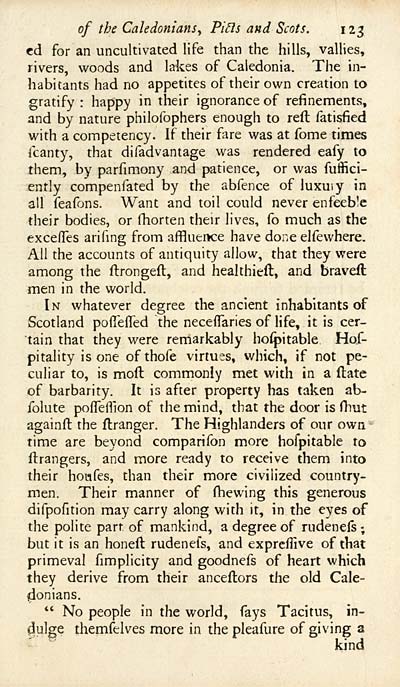Blair Collection > Critical dissertations on the origin, antiquities, language, government, manners, and religion, of the antient Caledonians, their posterity the Picts, and the British and Irish Scots
(161)
Download files
Complete book:
Individual page:
Thumbnail gallery: Grid view | List view

of the Caledonians y Pi^s and Scots. 123
cd for an uncultivated life than the hills, vallies,
rivers, woods and lakes of Caledonia. The in-
habitants had no appetites of their own creation to
gratify : happy in their ignorance of refinements,
and by nature philofophers enough to reft fatisfied
with a competency. If their fare was at fome times
fcanty, that difadvantage was rendered eafy to
them, by parfimony and patience, or was futfici-
ently compenfated by the abfence of luxuiy in
all feafons. Want and toil could never enfeeble
their bodies, or fhorten their lives, fo much as the
excefles arifing from afflueiKe have done elfewhere.
All the accounts of antiquity allow, that they were
among the ftrongeft, and healthieft, and braveft
men in the world.
In whatever degree the ancient inhabitants of
Scotland pofleffed the neceffaries of life, it is cer-
tain that they were rerriarkably hospitable Haf-
pitality is one ofthofe virtues, which, if not pe-
culiar to, is moft commonly met with in a ftate
of barbarity. It is after property has taken ab-
folute pofTeffion of the mind, that the door is fhut
againft the ftranger. The Highlanders of our own -
time are beyond comparifon more hofpitable to
ftrangers, and more ready to receive them into
their hoinfes, than their more civilized country-
men. Their manner of fhewing this generous
difpofition may carry along with it, in the eyes of
the polite part of mankind, a degree of rudenefs ;
but it is an honeft rudenefs, and expreffive of that
primeval fimplicity and goodnefs of heart which
they derive from their anceftors the old Cale-
donians.
" No people in the world, fays Tacitus, in-
dulge themfelves more in the pleafure of giving a
kind
cd for an uncultivated life than the hills, vallies,
rivers, woods and lakes of Caledonia. The in-
habitants had no appetites of their own creation to
gratify : happy in their ignorance of refinements,
and by nature philofophers enough to reft fatisfied
with a competency. If their fare was at fome times
fcanty, that difadvantage was rendered eafy to
them, by parfimony and patience, or was futfici-
ently compenfated by the abfence of luxuiy in
all feafons. Want and toil could never enfeeble
their bodies, or fhorten their lives, fo much as the
excefles arifing from afflueiKe have done elfewhere.
All the accounts of antiquity allow, that they were
among the ftrongeft, and healthieft, and braveft
men in the world.
In whatever degree the ancient inhabitants of
Scotland pofleffed the neceffaries of life, it is cer-
tain that they were rerriarkably hospitable Haf-
pitality is one ofthofe virtues, which, if not pe-
culiar to, is moft commonly met with in a ftate
of barbarity. It is after property has taken ab-
folute pofTeffion of the mind, that the door is fhut
againft the ftranger. The Highlanders of our own -
time are beyond comparifon more hofpitable to
ftrangers, and more ready to receive them into
their hoinfes, than their more civilized country-
men. Their manner of fhewing this generous
difpofition may carry along with it, in the eyes of
the polite part of mankind, a degree of rudenefs ;
but it is an honeft rudenefs, and expreffive of that
primeval fimplicity and goodnefs of heart which
they derive from their anceftors the old Cale-
donians.
" No people in the world, fays Tacitus, in-
dulge themfelves more in the pleafure of giving a
kind
Set display mode to: Large image | Transcription
Images and transcriptions on this page, including medium image downloads, may be used under the Creative Commons Attribution 4.0 International Licence unless otherwise stated. ![]()
| Permanent URL | https://digital.nls.uk/76288382 |
|---|
| Description | A selection of books from a collection of more than 500 titles, mostly on religious and literary topics. Also includes some material dealing with other Celtic languages and societies. Collection created towards the end of the 19th century by Lady Evelyn Stewart Murray. |
|---|
| Description | Selected items from five 'Special and Named Printed Collections'. Includes books in Gaelic and other Celtic languages, works about the Gaels, their languages, literature, culture and history. |
|---|

